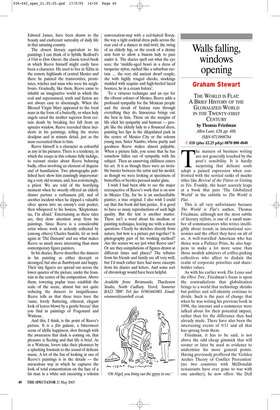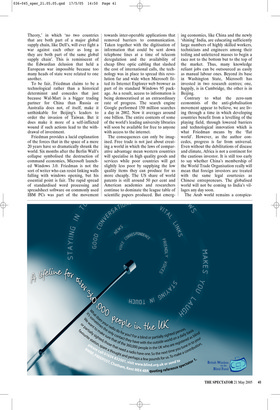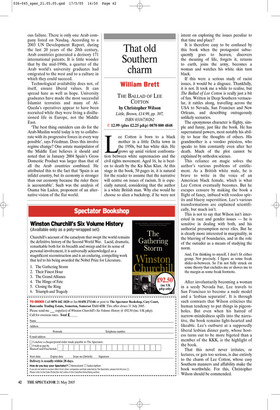Walls falling, windows opening
Graham Stewart
THE WORLD IS FLAT: A BRIEF HISTORY OF THE GLOBALIZED WORLD IN THE TWENTY-FIRST CENTURY by Thomas Friedman Allen Lane, £20, pp. 488, ISBN 0713998784 ✆ £18 (plus £2.25 p&p) 0870 800 4848 The masters of business writing are not generally touched by the poet’s sensibility. It is hardly surprising that delicate souls adopt a pained expression when confronted with the serried ranks of macho titles like Revival of the Fittest or Getting to Yes. Frankly, the heart scarcely leaps at a book that puts ‘The Globalized World’ in the subtitle to The World is Flat.
This is all very unfortunate because The World is Flat’s author, Thomas Friedman, although not the most subtle of literary stylists, is one of a small number of communicators who writes intelligibly about trends in international economics and the effect they have on all of us. A well-travelled American who has thrice won a Pulitzer Prize, he also happens to make a lot more sense than those modish admirers of coffee-picking collectives who affect to disdain the realm of corporate priorities and shareholder values.
As with his earlier work The Lexus and the Olive Tree, Friedman’s focus is upon the contradictions that globalisation brings to a world that technology shrinks but politics and self-identity continue to divide. Such is the pace of change that when he was writing his previous book in 1998, the internet and e-commerce were talked about for their potential impact, rather than for the difference they had already made. There have also been the intervening events of 9/11 and all that has sprung from them.
Friedman, it has to be said, is not above the odd cheap gimmick that will sooner or later be used as evidence to undermine his more general points. Having previously proffered the ‘Golden Arches Theory of Conflict Prevention’ (no two countries with McDonalds restaurants have ever gone to war with one another), he now offers ‘the Dell Theory,’ in which ‘no two countries that are both part of a major global supply chain, like Dell’s, will ever fight a war against each other as long as they are both part of the same global supply chain’. This is reminiscent of the Edwardian delusion that held a European war impossible because too many heads of state were related to one another.
To be fair, Friedman claims to be a technological rather than a historical determinist and concedes that just because Wal-Mart is a bigger trading partner for China than Russia or Australia does not, of itself, make it unthinkable for Beijing’s leaders to order the invasion of Taiwan. But it does make it more of a self-inflicted wound if such actions lead to the withdrawal of investment.
Friedman provides a lucid explanation of the forces that in the space of a mere 20 years have so dramatically shrunk the world. Six months after the Berlin Wall’s collapse symbolised the destruction of command economies, Microsoft launched Windows 3.0. Friedman is not the sort of writer who can resist linking walls falling with windows opening, but his essential point is fair. The rapid spread of standardised word processing and spreadsheet software on commonly used IBM PCs was part of the movement towards inter-operable applications that removed barriers to communication. Taken together with the digitisation of information that could be sent down telephone lines at a time of telecom deregulation and the availability of cheap fibre optic cabling that slashed the cost of international calls, the technology was in place to spread this revolution far and wide when Microsoft fitted its Internet Explorer web browser as part of its standard Windows 95 package. As a result, access to information is being democratised at an extraordinary rate of progress. The search engine Google performed 150 million searches a day in 2002. Now it averages around one billion. The entire contents of some of the world’s leading university libraries will soon be available for free to anyone with access to the internet.
The consequences can only be imagined. Free trade is not just about creating a world in which the laws of comparative advantage mean western countries will specialise in high quality goods and services while poor countries will get slightly less poor by supplying the low quality items they can produce for us more cheaply. The US share of world patents is still around 50 per cent and American academics and researchers continue to dominate the league table of scientific papers produced. But emerg ing economies, like China and the newly ‘shining’ India, are educating sufficiently large numbers of highly skilled workers, technicians and engineers among their toiling and unlettered masses to begin a race not to the bottom but to the top of the market. Thus, many knowledge reliant jobs can be outsourced as easily as manual labour ones. Beyond its base in Washington State, Microsoft has invested in two research centres; one, happily, is in Cambridge, the other is in Beijing.
Contrary to what the zero-sum economists of the anti-globalisation movement appear to believe, we are living through a time in which developing countries benefit from a levelling of the playing field, through lowered barriers and technological innovation which is what Friedman means by the ‘flat world’. However, as the author concedes, progress is far from universal. Even without the debilitations of disease and climate, Africa is not a continent for the cautious investor. It is still too early to say whether China’s membership of the World Trade Organisation really will mean that foreign investors are treated with the same legal courtesies as Chinese entrepreneurs. The globalised world will not be coming to India’s villages any day soon.
The Arab world remains a conspicu ous failure. There is only one Arab company listed on Nasdaq. According to a 2003 UN Development Report, during the last 20 years of the 20th century, Arab countries generated a derisory 171 international patents. It is little wonder that by the mid-1990s, a quarter of the Arab world’s university graduates had emigrated to the west and to a culture in which they could succeed.
Technological availability does not, of itself, ensure liberal values. It can spread hate as well as hope. University graduates have made the most successful Islamist terrorists and many of AlQaeda’s operatives appear to have been recruited while they were living a disillusioned life in Europe, not the Middle East.
‘The best thing outsiders can do for the Arab-Muslim world today is try to collaborate with its progressive forces in every way possible’, says Friedman. Does this involve regime change? One astute manipulator of the Middle East believes it should and noted that in January 2004 Spain’s Gross Domestic Product was larger than that of all the Arab countries combined. He attributed this to the fact that ‘Spain is an infidel country, but its economy is stronger than our economy because the ruler there is accountable’. Such was the analysis of Osama bin Laden, proponent of an alternative vision of the flat world.



























































 Previous page
Previous page